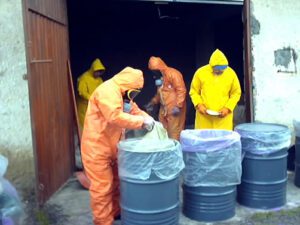
Labs, pharmacies, hospitals, healthcare providers, and even households use a variety of chemical-based products that generate hazardous chemical waste. How should you dispose of empty chemical containers is governed by environmental laws that strictly regulate the disposal of such containers. The residue within empty chemical containers can pose a threat as hazardous waste if not treated properly. Disposing of containers without treating them first could allow chemical runoff to mix with groundwater, seep through soil, and eventually get consumed, harming humans and wildlife.
Preventing such outcomes begins with knowing how to manage the chemicals carefully and make all efforts to reduce the amount of chemical waste you or company, institution or household produces. If possible, reuse or recycle chemicals and chemical containers first. If not possible, they need to be disposed of properly.
How Do I Know if a Container is “Empty”?

An empty chemical container is, by EPA definition, one in which all the liquid or materials has been removed through normal mean of emptying a container via “pouring, pumping or aspirating.” Liquid containers must not have one last drop in them. Containers which have held solid and semi-solid hazardous material are only considered empty if any residual content cannot be removed by scraping or chipping.
What to Do With Empty Chemical Containers
Reuse
One of the best uses for empty chemical containers is to reuse whenever it is possible or appropriate. Old containers can be used for water storage collection or to dispose of spill residue. These containers should not be used for any radioactive waste storage or disposal. Be sure that the container you reuse is compatible with the hazardous waste or other chemicals you are storing. Reusing an empty container requires its cleaning before storing hazardous waste and other chemicals in it. Containers that have not been thoroughly cleaned of its chemical residue could cause a combustible chemical reaction. Finally, all original labels and markings need to be removed from the container and replaced with labels that clearly display the current contents of the container.
Recycle

Dispose

It’s important to that all empty chemical containers are cleaned following specific guidelines and procedures as defined by regulations and laws. Whether you reuse, recycle or dispose of the container depends on its original content. Knowing what to do with the empty container is the first step in preventing any harmful residue from being dumped or disposed of improperly. To learn more about how to dispose of empty chemical containers properly, please contact us today!

